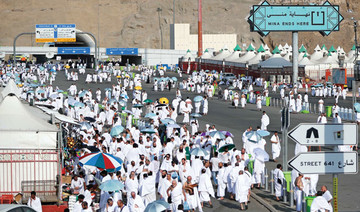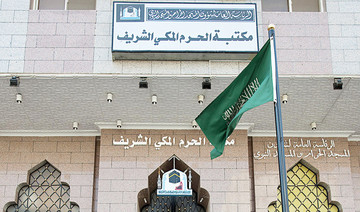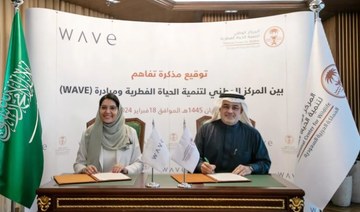JEDDAH: Ali Bey Al-Abbasi was not the first European enamored with the Arab Peninsula and the mysteries of Makkah. Nor was he the first Westerner to visit the city — but he was an unusually resourceful man, with wealth of unknown origin and a great thirst for discovery, who provided Westerners with the first comprehensive account of the city.
He was born Domingo Francisco Jorge Badía y Leblich in Barcelona in 1767. After receiving a liberal education, he focused on astronomy, medicine and mineral science. He also developed an interest in learning Arabic.
“Al-Abbasi was an agent of the king of Spain or of Napoleon,” says August Raleigh, author of the book “Makkah in the Eyes of a Christian Pilgrim.”
In 1801, Al-Abbasi set off for Paris and London, returning to Spain two years later wearing Islamic clothing. Later, he formed a close friendship with the sultan of Morocco who, with growing affection, advised the Spaniard to find a wife, to which Al-Abbasi replied that he had made a pledge not to marry before visiting Makkah. The sultan tried to discourage Al-Abbasi from making the trip but when he could not, and saw the determination of his friend, he presented him with a beautiful, extravagant tent as a gift.
On the third day of Shawwal, 1806, Al-Abbasi joined a convoy heading to Makkah, taking with him 14 camels and two horses. He boarded a ship from Suez but fate, and the weather, were not on his side. The vessel floundered and sank, forcing Al-Abbasi and his men to flee in a lifeboat and row for hours before reaching the safety of a Red Sea island. From there, they were rescued and taken to Jeddah.
On the 12th day of Dul Qaada, Al-Abbasi had to be carried on a stretcher because he had a fever that weakened him and damaged his bones. The next day he and his companions wore Ihram garments and walked along winding roads until they reached Makkah.
Al-Abbasi entered the city and when he reached the courtyard of the mosque, a guide gestured for him to stop. He pointed to the Kaaba and said: “Look. Look at the house of God.”
The Spaniard was deeply affected by the reverence of his experience. He wrote: “The house of God is covered with a black robe from above to be draped, surrounded by a ring of lamps, the unaccustomed hour and the stillness of the night; and our guide, who was speaking before us as if he were inspired, all these images formed an amazing image that will not be erased from my memory.” 
He remained in the city, living among noblemen and aristocrats. The governor of Makkah even asked him to help clean the Kaaba. Describing one of the many incredible sights that he witnessed, during a year when the number of pilgrims was 83,000, Al-Abbasi wrote: “Only in Arafat can one get an idea of the majestic scene of pilgrimage. There are countless people from all nations and colors from every corner of the world. Despite the thousands of countless dangers and obstacles that they had to overcome, all of them worship one God. Everyone counts themselves as members of one family. There is no intermediary between man and his Lord; everyone is equal before their creator.”
Al-Abbasi, who later wrote of his experiences, was the first European to present to the world a detailed account of Makkah, unlike the fragmented notes of earlier travelers such as Ludovico di Varthema and Joseph Bates. He went so far as to include a precise location, determined through astronomical observation, and recreated a map of the Grand Mosque.
Al-Abbasi continued to travel, visiting many countries before he died of dysentery in 1818, in Aleppo, Syria. He was buried in Balqa, near Amman, the capital of Jordan.
Enigmatic traveler who revealed full majesty of Makkah to the world
Enigmatic traveler who revealed full majesty of Makkah to the world

- The next day he and his companions wore Ihram garments and walked along winding roads until they reached Makkah
- The vessel floundered and sank, forcing Al-Abbasi and his men to flee in a lifeboat and row for hours before reaching the safety of a Red Sea island
Greece’s prime minister receives MWL chief in Athens

RIYADH: Greek Prime Minister Kyriakos Mitsotakis received the secretary-general of the Muslim World League on Tuesday in Athens, the Saudi Press Agency reported.
During the meeting, Mitsotakis and Mohammed Al-Issa discussed a number of topics of common interest.
Al-Issa, who is also chairman of the Association of Muslim Scholars spoke about Islamic values that call for global peace and understanding between its peoples, and said he appreciated the warm reception he received during his visit and the good sentiments expressed toward the Islamic civilizational contribution.
Al-Issa then met with Islamic officials in Greece, including muftis and imams, and visited the Athens Mosque, during which he expressed his pleasure with the additional dialogue that took place during the meeting.
He also met with Ieronymos II, the Archbishop of Athens and All Greece, during which the two sides stressed the importance of the role of religious leaders in addressing all forms of religious, ethnic, and civilizational clashes around the world.
Saudi environment and water minister heads Kingdom’s delegation at World Water Forum

RIYADH: Saudi Arabia’s Minister of Environment, Water and Agriculture, Abdulrahman Al-Fadhli, is heading the Kingdom’s delegation participating in the 10th World Water Forum in Bali and will attend the high-level session, on behalf of Crown Prince Mohammed bin Salman.
The forum, inaugurated by Indonesian President Joko Widodo, kicked off Saturday and runs until May 25, with heads of state and government, ministers and officials from 180 countries, and 250 international organizations attending.
The Kingdom is participating with a high-level delegation representing the water sector, and will participate in an exhibition that highlights its efforts in developing the water industry through its regional and international contributions.
It will also organize a dialogue session on the sidelines of the forum in preparation for the Kingdom’s hosting of the 11th session of the World Water Forum in 2027 in Riyadh, under the slogan “Action for a Better Tomorrow.”
The Kingdom’s hosting of the event also comes as “confirmation of Saudi Arabia’s role in addressing water challenges around the world and its commitment to issues of environmental sustainability, based on what it has provided over decades of pioneering global experience in producing, transporting and distributing water and innovating technical solutions to its challenges,” the Saudi Press Agency reported.
The Kingdom has helped push water issues to the top of the international agenda, a move it adopted during its hosting of the G20 in 2020, and to put strategic plans to ensure water security, strengthen partnerships with global and scientific institutions, and build capacities at all levels, SPA added.
This year’s forum is being held under the slogan “Water for Shared Prosperity,” and will discuss several sub-themes, including water security and prosperity; disaster risk reduction and management; and hydro-diplomacy.
Tears of joy as American reunites with Saudi family after 40 years

- Relatives in Saudi Arabia say they ‘never lost hope’ they would one day find Eid Alsumani
- Eid and his older brother grew up in Alabama estranged from their father and other family members
JEDDAH: A four-decade long search has finally led to the heartwarming reunion of an US citizen with his Saudi family, putting an end to a painful era full of longing and searches that had long promised to end in disappointment.
Two-year-old Eid Alsumani, now 42, and his older brother’s American mother cut ties with the family for reasons that have not been revealed to the public.
She had met Saud Alsumani when he was a student in the US, after which they married and had two sons.

Following her return to Alabama with the boys, Eid’s mother cut all communication between them and their father, who returned to Saudi Arabia.
“Throughout that period of time, which lasted 40 years, members of the family were searching for their sons through the American Embassy ... (they) tried to search for the family several times, but no leads helped,” said Bander Alsumani, Eid’s cousin.
HIGHLIGHTS
• A video of Eid Alsumani’s reunion with his family at King Abdulaziz International Airport after 40 years of separation went viral on social media.
• For decades, the family had tried everything including seeking the help of the Saudi Embassy in Washington.
An English teacher at Abdullah Al-Thagafi High School in Jeddah, Bander told Arab News that his family did not lose hope in finding the lost brothers. “We just hoped they were alive.”
After decades of searches that yielded no results, their father died, never having reconnected with his sons. Their uncle, Khalid Alsumani, went to the US, determined to find his estranged nephews.

According to Bander, while the uncle sought the help of the Saudi Embassy in Washington, the perseverence of another member of the family paid off as they found Eid on Instagram.
“It was the happiest day for the family ... we all were in joy and happiness when we heard Eid is alive and coming back home with his uncle,” said Bander. The joy also came with the sad news that Eid’s older brother had already died.
Eid and his family were finally reunited on May 9, with many of them meeting their 42-year old relative for the first time.
I believe I will visit again in maybe six months. Inshallah, I will continue to learn more about my religion, Arabic, and my family.
Eid Alsumani, Found after 40 years
“It was the most wonderful feeling in the world … just couldn’t believe that the family had been reunited with (their) son after so many years,” said Bander.
A heartwarming video of Eid’s reunion with his family at King Abdulaziz International Airport after 40 years of separation went viral on social media.
When Eid appeared from passport control with his uncle, his cousins and relatives hugged him one after another tightly, shedding tears of joy.
The family hosted a gathering with various members of the family who came from all corners to meet the long lost son and celebrate the joyous occasion.
During the emotional reunion, Eid, dressed in traditional Saudi attire, expressed his immense happiness and relief at being reunited with his extended family.
A US citizen, Eid was raised in Alabama and currently resides in Florida having graduated with bachelor’s of science degree in history and nuclear engineering technology.
Speaking to Arab News after performing Umrah in Makkah, Eid described the scene at the airport as “unbelievable.”
He said: “It was surreal. It was the first time I had been in my fatherland.
“I was extremely excited about the blessings of seeing four family members who greeted me with the legendary hospitality of Saudi fame. It felt like a scene from a movie.”
Eid, who was raised by his mother with Christian values, has reconnected with Islam with the help of his Saudi relatives.
He described praying in the Grand Mosque in Makkah as an unforgettable moment in his life. “When I was in Makkah, I was amazed to see so many people from all over the world who were walking and praying together as one for the sake of Allah,” he said.
Speaking about his future in the Kingdom, he added: “Alhamdulillah, my stay has been extended for a few days … I believe I will visit again in maybe six months. Inshallah, I will continue to learn more about my religion, Arabic, and my family.”
Wildlife center to explore caves in Saudi Arabia’s north

- The program to explore biodiversity in caves was launched “due to its environmental significance and positive impact on wildlife”
RIYADH: Teams from Saudi Arabia’s National Center for Wildlife will begin examining various caves in the Northern Borders region as part of the Caves Exploration Program, which began in 2022.
It comes as part of a larger program that monitors ecosystems and biodiversity throughout the Kingdom.
These sites will be added to an international map of biodiversity and natural heritage hotspots as historical ecosystems and natural biological museums.

Dr. Mohammed Ali Qurban, CEO of the center, explained that the discoveries in the caves hold significant historical environmental value for Saudi Arabia.
“The cave ecosystems serve as a historical museum, providing evidence of the biological diversity that has existed in the Kingdom throughout various historical eras, as well as the spatial, environmental, and climatic changes in the Arabian Peninsula,” he explained.
The cave ecosystems serve as a historical museum, providing evidence of the biological diversity that has existed in the Kingdom throughout various historical eras.
Dr. Mohammed Ali Qurban, National Center for Wildlife CEO
Qurban added that these unique ecosystems provide a suitable environment for a wide range of organisms, as evidenced by the discovery of numerous skeletons of different types of mammals.
The program to explore biodiversity in caves was launched “due to its environmental significance and positive impact on wildlife.”
The center is currently completing studies on the targeted cave sites and documenting their importance within an integrated program.
According to Qurban, the center’s earlier discovery of several Arabian cheetah mummies in a cave in the northern part of the Kingdom — with some skeletons estimated to be over 4,000 years old — provided the first evidence of the species’ presence in the Kingdom.
Consequently, the center plans to develop a program for the resettlement of the Arabian cheetah in the Kingdom, enabling it to play a crucial role in maintaining environmental balance.
Qurban noted that, among other significant discoveries, researchers from the center discovered rare bats and the remains of several extinct animals.
The center is currently working on classifying these finds and determining their ages. This effort will facilitate the resettlement of these extinct species or their closest genetic relatives, thereby restoring their role.
The cave ecosystem is one of the rarest and most important of its kind in the world, recognized as natural heritage by UNESCO.
There are 1,826 caves in the Kingdom, consisting of underground passages and tunnels formed by natural processes in dry limestone areas — evidence of a historical era that experienced prolonged rainy climatic conditions.
Jeddah university opens maritime studies to women

- The university will set up a dedicated agency for female students within the maritime studies faculty as part of an initiative that aligns with Saudi Arabia’s Vision 2030
RIYADH: Jeddah’s King Abdulaziz University will enroll women in its maritime studies programs for the first time, the Saudi Press Agency reported on Saturday.
The university will set up a dedicated agency for female students within the maritime studies faculty as part of an initiative that aligns with Saudi Arabia’s Vision 2030, which encourages Saudi women to enter new professions, and aims to expand research and study opportunities in this field.
Faisal Al-Thobiani, dean of the faculty of maritime studies, said the move will harness women’s potential in the sector, increasing overall efficiency and sustainability.
The faculty will provide internationally recognized education and training in marine surveying and transport, helping to prepare Saudi professionals and support national economic growth.
Al-Thobiani said that increasing women’s participation will address workforce gaps in the Kingdom’s maritime industry in line with global trends.
Growing female involvement in the sector comes as Vision 2030 prioritizes women’s representation across various industries, he added.




















